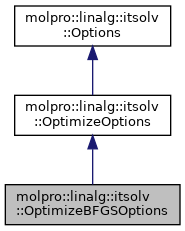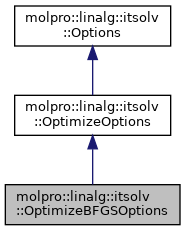Allows setting and getting of options for OptimizeBFGS instance via IterativeSolver base class.
More...
#include <OptimizeBFGSOptions.h>
Allows setting and getting of options for OptimizeBFGS instance via IterativeSolver base class.
◆ OptimizeBFGSOptions() [1/2]
| molpro::linalg::itsolv::OptimizeBFGSOptions::OptimizeBFGSOptions |
( |
| ) |
|
|
default |
◆ OptimizeBFGSOptions() [2/2]
| molpro::linalg::itsolv::OptimizeBFGSOptions::OptimizeBFGSOptions |
( |
const options_map & |
opt | ) |
|
◆ linesearch_grow_factor
| std::optional<double> molpro::linalg::itsolv::OptimizeBFGSOptions::linesearch_grow_factor |
If the predicted line search step is extrapolation, limit the step to this factor times the current step
◆ linesearch_tolerance
| std::optional<double> molpro::linalg::itsolv::OptimizeBFGSOptions::linesearch_tolerance |
If the predicted line search is within tolerance of 1, don't bother taking it.
◆ max_size_qspace
| std::optional<int> molpro::linalg::itsolv::OptimizeBFGSOptions::max_size_qspace |
◆ norm_thresh
| std::optional<double> molpro::linalg::itsolv::OptimizeBFGSOptions::norm_thresh |
◆ quasinewton_maximum_step
| std::optional<double> molpro::linalg::itsolv::OptimizeBFGSOptions::quasinewton_maximum_step |
Quasi-Newton steps with an L-2 norm larger than this will be scaled down to this value.
◆ strong_Wolfe
| std::optional<bool> molpro::linalg::itsolv::OptimizeBFGSOptions::strong_Wolfe |
Whether to use strong or weak Wolfe conditions.
◆ svd_thresh
| std::optional<double> molpro::linalg::itsolv::OptimizeBFGSOptions::svd_thresh |
◆ Wolfe_1
| std::optional<double> molpro::linalg::itsolv::OptimizeBFGSOptions::Wolfe_1 |
Acceptance parameter for function value.
◆ Wolfe_2
| std::optional<double> molpro::linalg::itsolv::OptimizeBFGSOptions::Wolfe_2 |
Acceptance parameter for function gradient.


 Public Member Functions inherited from molpro::linalg::itsolv::OptimizeOptions
Public Member Functions inherited from molpro::linalg::itsolv::OptimizeOptions Public Member Functions inherited from molpro::linalg::itsolv::Options
Public Member Functions inherited from molpro::linalg::itsolv::Options Public Attributes inherited from molpro::linalg::itsolv::Options
Public Attributes inherited from molpro::linalg::itsolv::Options